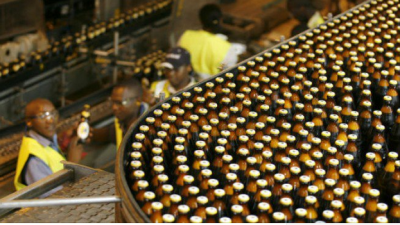The National Agency for Food and Drug Administration and Control (NAFDAC) has imposed a fine of N1 billion on Guinness Nigeria Plc for allegedly re-validating expired raw materials without approval, Punch has reported.
The agency also accused the company, which has been operating in Nigeria since 1962, of maintaining poor documentation and not complying with some of its regulations.
The local unit of Diageo was given a 2-week ultimatum to pay the fine, the newspaper reported, quoting a letter written by the regulatory agency.
But the company, which said it was in talks with NAFDAC over the sanction, denied flouting the rules of the regulatory agency.
“As a responsible corporate organisation, we take these allegations which relate primarily to raw materials stored in one of our raw materials stores very seriously,” Peter Ndegwa, managing director of Guinness Nigeria PLC, said in a statement issued on Thursday.
“We are engaging NAFDAC for clarifications and resolution of the issues.
“The high quality of products from Guinness Nigeria’s breweries,” he said, “has been attested to repeatedly not only by NAFDAC but also by the Standards Organization of Nigeria, as well as the internal quality controls of the Diageo Group.
“Basic raw materials are first converted during the brewing stage, with lots of critical control points, before products are bottled and released to the market. Each of these painstaking steps is rigorously monitored for conformity with all necessary global standards which we regard as basic, as we always aspire to exceed the much higher standards that have been set internally by the Diageo Group.”
Earlier, Guinness wondered why NAFDAC took such punitive measure against it.
“The management of Guinness Nigeria does not fully understand the basis for the computation of the administrative charges nor the particular regulations alleged to have been infringed,” read a statement obtained by Punch.
“Guinness Nigeria is cognizant of its responsibility to adhere to relevant laws and regulations, which are applicable to its operations, including regulations issued by NAFDAC, and takes this obligation seriously.
“We remain committed to working with NAFDAC and other regulatory authorities in furtherance of our responsibility to produce and market quality products, which are enjoyed by consumers throughout Nigeria, and look forward to being able to resolve the issue working in partnership with NAFDAC.”
Regulatory agencies have been firmer with the enforcement of laws since the emergence of President Muhammadu Buhari.
The Central Bank of Nigeria has imposed sanctions on at least three commercial banks for alleged breaches in the last two months.
Last month, the Nigerian Communications Commission (NCC) imposed a huge fine on MTN, the largest telecommunication outfit in the country, for failing to deactivate 5.1 million unregistered SIM cards.
END


Be the first to comment